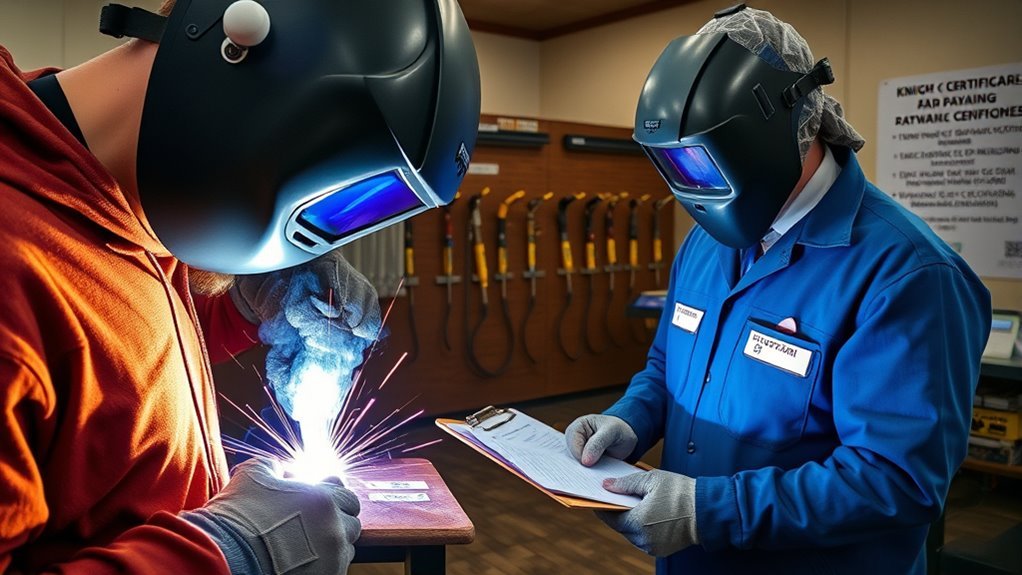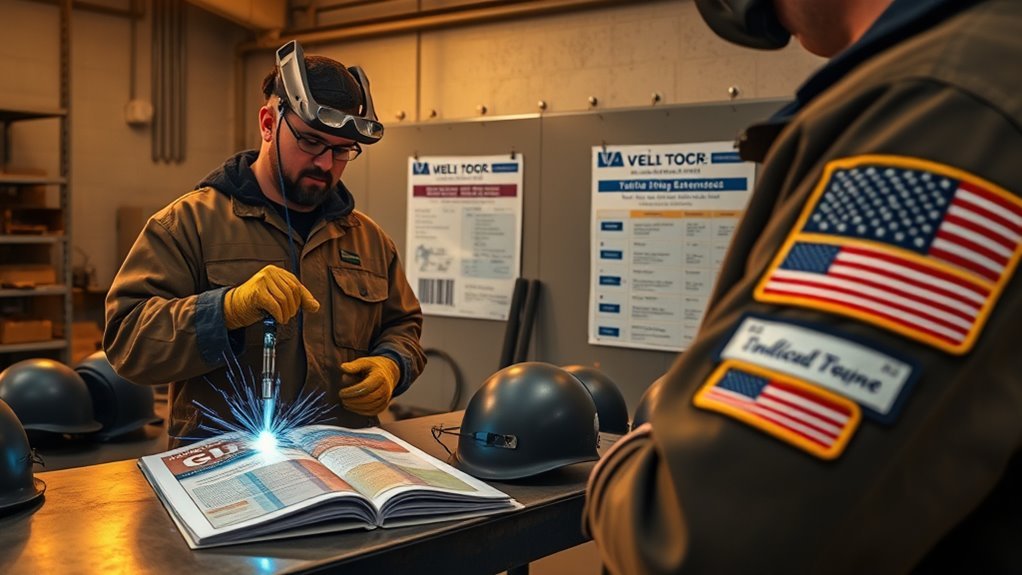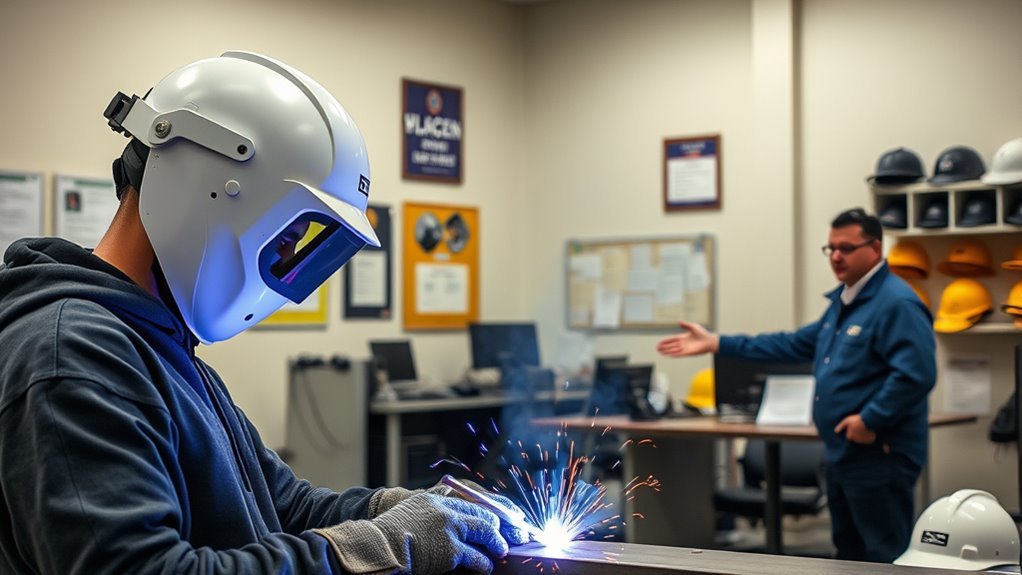If you’re weighing the cost of Knight School of Welding, expect around $4,100 for the 8-week evening program plus extras like a $125 application fee, testing costs, and tools or safety gear. That still makes it cheaper than many programs, but your total expenses will vary depending on the certifications you want and living costs. Keep this in mind as you compare options and look for ways to cut your out-of-pocket spending.
Quick Answer
- The 8-week evening program costs about $4,100 in tuition.
- Add $125 for the application, $500–$1,500 for tools and safety gear, plus testing fees.
- Eligible veterans can use GI Bill benefits to lower costs.
- You get lifetime job assistance after you finish.
- It’s faster and more affordable than most other welding schools.
Tuition and Program Pricing Breakdown

Although Knight School of Welding’s 8-week evening program costs about $4,100, you should weigh that against typical costs elsewhere. The program still comes in cheaper than the average welding school, where tuition often starts near $5,000 and averages about $6,850.
The base price stays competitive, but budget for the extras: an application fee around $125, testing fees between $300 and $550 per test, and tools plus safety gear that run $500–$1,500.
Certification exams can improve your job chances, though they may add $800–$1,100. Living costs for housing, food, and books can raise the total quite a bit.
Ask the school about tuition discounts or scholarships when you apply. These can cut your net cost noticeably.
Compare the full estimated costs at local and national programs, not just tuition, so you can choose based on real expenses versus the return you expect.
Course Lengths and What They Include

The 8-week evening program at Knight School of Welding packs intensive hands-on instruction into a short time. You learn core welding methods—MIG, STICK, TIG, and pipe welding—along with safety practices and job-ready techniques designed for beginners.
The course runs for eight weeks and mixes shop time with focused classroom work so you build practical skills quickly.
The curriculum covers safety, best practices, and real-world jobs. You start with basic bead work, move to joints and pipe fittings, then finish certification-ready projects.
Day and evening class options give you scheduling flexibility to fit around work or other commitments.
Because the courses suit newcomers, instructors start with foundational techniques and then move to certification standards that are built into the curriculum.
Additional Fees and Supplies to Expect

Now that you know what the eight-week program covers, here are the extra costs to plan for. You pay an application fee of about $125 and should budget for books at $220 plus tools and safety gear from $500 to $1,500. Housing can vary a lot—figure $500 to $10,000 for your training period depending on where you stay and how long. Testing fees for required exams usually run $300–$550 per test and are not part of tuition.
| Item | Typical Cost | Notes |
|---|---|---|
| Application | $125 | One-time fee |
| Books & supplies | $220 | Minimum supplies budget |
| Tools & PPE | $500–$1,500 | Essential additional expenses |
Build these into your total so you avoid surprises while you train.
Certification Exam and Renewal Costs

You’ll usually pay $800–$1,100 for initial certification exams at Knight School of Welding, with some specialized credentials costing more.
Many employers want certification beyond the diploma, so budget for the exam.
Expect AWS welder certification maintenance costs of about $105 per year to keep credentials current.
Initial Exam Fees
Several costs go into initial welding certification, so plan accordingly. Certification exams at Knight School of Welding typically run $800–$1,100 depending on the credential, while individual initial tests are usually $300–$550 per test.
Factor those fees into your training budget along with required tools and safety gear, which can add $500–$1,500.
During exam preparation, focus on practical skill drills and testing strategies that match certification formats to avoid retests.
Know that some certifications bundle written and practical parts, which affects the price.
Pay attention to scheduling, eligibility, and exactly what each fee covers so you avoid surprise charges.
Budget realistically so you can finish certification without delays or extra stress.
Renewal and Recertification
Because certifications need regular upkeep, expect recurring costs. AWS welder certification maintenance runs about $105 per year, while full re-exams through Knight School of Welding still cost about $800–$1,100 depending on the credential.
You can budget for the AWS renewal process or choose a full re-exam when your credential lapses or you want a higher level. Recertification keeps you eligible with employers, opens higher pay, and improves job stability.
- Plan: track your renewal windows and set aside the fee to avoid lapses.
- Re-exam choice: pay $800–$1,100 for upgraded or lapsed certifications through Knight School.
- Return on investment: factor recertification benefits—required credentials and better hiring prospects—into your long-term career costs.
Financing Options and Payment Plans

If paying the full $4,100 upfront feels tough, Knight School of Welding offers financing and payment plans. These spread the course cost and any added fees over time so you can start training sooner.
Ask about scholarship opportunities and payment assistance when you apply. Staff can explain short-term grants, sliding-scale options, or referrals to outside scholarships.
Many students use monthly payment plans that break the balance into manageable installments. Get the schedule and any interest or fees in writing.
Remember to include the likely extras—application fee around $125, testing at $300–$550 per test, and tools up to $1,500—when you set your budget.
If a plan won’t cover everything, the school’s financial advisors can point you to third-party loans, employer tuition help, or community resources.
Before you sign up, compare the total cost, payment dates, penalties for late payments, and whether finishing or getting certified affects the final balance.
VA Benefits and Military Veteran Support

When you’re leaving service, Knight School of Welding supports you by accepting VA education benefits through the Kentucky State Approving Agency and offering veteran-specific programs designed for your needs.
You’ll find practical help that lets you use GI Bill funds to cover training costs and reduce what you pay out of pocket. The school provides tailored veteran resources and a supportive setting to make the shift into civilian training easier.
- Eligibility and benefits: The school is approved for VA education benefits, so you can apply GI Bill funds and verify enrollment through the Kentucky State Approving Agency.
- Program design: Courses fit veteran learning styles with focused instruction, flexible scheduling, and targeted support for skills transfer.
- Transition services: You’ll access veteran resources that include resume help, employer networking, and guidance on getting the most from VA benefits to keep training affordable.
Job Placement and Lifetime Employment Assistance

Finishing training is just the start. Knight School of Welding stays with you by offering lifetime job assistance to every graduate.
You get ongoing employment support during your job search, including help tailoring resumes and sharpening interview skills so you look like a strong candidate. The school also prepares you for employer-specific welding tests that many companies use to screen applicants.
Knight School connects you with local employers through networking with shops and contractors who hire welders. That direct connection, plus test prep and polished materials, improves your chances of quick placement.
The school builds this support into its programs, so you never have to handle the job search alone. If you need refreshers or help later in your career, the lifetime assistance means you can come back for guidance whenever hiring needs change.
Comparing Knight School to Other Welding Schools

Because Knight School of Welding packs hands-on training into an eight-week, $4,100 evening program, it stands out for affordability and speed compared with typical U.S. welding programs that often cost $5,000–$15,000 and average about $6,850.
In a Knight School comparison, you’ll see shorter duration and targeted certification that get you job-ready faster than many traditional programs. This favors you if you want condensed, practical skill development without a long commitment.
- Cost and duration: Knight School’s $4,100, eight-week format vs. community colleges and schools like Lincoln Electric (~$6,850) or Tulsa Welding School (~$19,977).
- Curriculum focus: Hands-on, certification-oriented training that mirrors industry tasks and prioritizes practical competence over academic breadth.
- Employability: Specialized certification can improve hiring prospects quickly, though community colleges may offer broader credentials and campus resources.
Use this comparison to weigh speed, price, and credential type when you pick your welding path.
Tips for Reducing Your Overall Training Costs

Want to keep Knight School training affordable? Start with financial aid. The school offers assistance and financing plans that can cover part of tuition.
If you qualify, use VA educational benefits to cut costs a lot. Ask admissions about training discounts, seasonal promotions, or bundled pricing that lower what you pay.
Choose day classes when they fit—they sometimes cost less than evening sessions and can reduce your total expense.
Opt for daytime classes when possible—they can be cheaper than evenings and lower your overall training costs.
Take advantage of the lifetime job assistance to shorten your job search and avoid long unpaid gaps after graduation.
Be smart about tools and gear: buy only what you need, compare new versus used, or rent until you’re sure—expect $500–$1,500 total for tools and safety gear.
Combine aid, discounts, smart scheduling, and careful equipment choices to reduce your overall training costs without losing quality.
Frequently Asked Questions
Are Housing or Relocation Services Available for Out-Of-State Students?
Yes — you’ll find housing assistance and limited relocation services for out-of-state students. The school offers referrals, local housing lists, and occasional placement help, though you’ll handle most arrangements and costs yourself.
Does Knight School Offer Evening or Weekend Class Schedules?
Yes — you’ll find evening classes and weekend schedules available for flexibility. They’re designed for working students, run with the same curriculum and instructors as daytime programs, and you’ll register through the admissions office.
Are Apprenticeship or Union Placement Partnerships Available?
A former student landed a pipefitting apprenticeship through a local contractor. You’ll find apprenticeship opportunities and union partnerships arranged or advertised by the school. You can apply, interview, and often join through those connections.
What Safety Protocols and COVID-19 Measures Are in Place?
You’ll follow strict safety equipment protocols and updated health guidelines: PPE, ventilation, daily health screenings, sanitizing stations, distancing in labs, reduced class sizes, and mandatory symptom reporting, so you stay protected while training.
Is There Alumni Networking or Continuing Education Discounts?
About 78% of graduates stay connected, and you’ll find alumni benefits like job referrals and mentorship. You’ll also get education discounts for advanced modules or refresher courses, keeping your skills current and career opportunities growing.
Conclusion
So, Knight School of Welding costs about $4,100 for the core 8-week evening program—clearly a bargain if you enjoy paying less than most people. You’ll still need about $125 for the application, $300–$550 per certification test, and $500–$1,500 for tools and safety gear, plus living costs. You can use financing, VA benefits, or payment plans to ease the hit. Ironically, spending a little now usually saves you a lot later.


